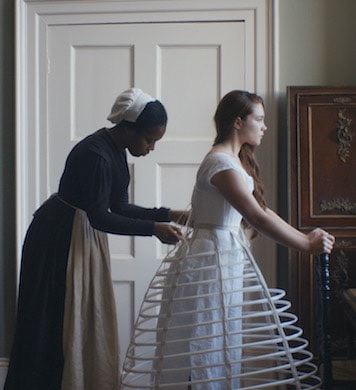Review:
"Lady MacBeth"

Release Date: July 28, 2017
Rating: R Running Time: 89 minutes Lady MacBeth is a period drama for people who hate period dramas. Director William Oldroyd’s riveting adaptation of Russian writer Nikolai Leskov’s 1865 novella “Lady Macbeth of the Mtsensk District” expertly combines piercing social commentary on England’s 19th-century class system with hearty amounts of sex and violence. It also features three impactful performances by newcomers Florence Pugh, Cosmo Jarvis and Naomi Ackie, all of whom deserve to be household names as a result of their participation in this devious tale of forbidden love and self-preservation. Working from a economical but twisted script credited to Alice Birch, Oldroyd rejects the lush production values of your typical Merchant-Ivory costume drama in favor of setting Lady MacBeth in a drab and unforgiving rural estate that reflects the harsh relationship between Florence Pugh’s newly married Katherine, her inattentive husband Alexander (Paul Hilton), and her dismissive father-in-law Boris (Christopher Fairbank). In Boris’ eyes, the steely Katherine doesn’t know her place as a wife and the lady of the house. Katherine, however, is trapped in a loveless marriage to an oft-absent boor who shows no interest in her emotionally or sexually. So Katherine begins a torrid affair with Cosmo Jarvis’s rough-and-tumble Sebastian that threatens her marriage and social standing. The sexual energy that exists between Pugh and Jarvis is undeniable, and it drives the narrative toward a cruel ending that positions Katherine as a woman clearly modelled on William Shakespeare’s beguiling and manipulative Lady Macbeth. The haunting final shot, a distillation of the class, gender and racial issues director William Oldroyd scrutinizes, offers a glimpse at a bleak future of Katherine’s own making. While Katherine often finds herself obeying her husband’s demands, she is inherently strong of heart and her defiance toward him grows with each passing day he is absent. Pugh instills Katherine with a boldness that is employed effectively at the pivotal moments in Lady MacBeth as well as a cunning that serves Katherine well when events turn against her. Jarvis presents Sebastian as everything Katherine wants in a lover—he’s handsome, devoted, available. He also makes Sebastian malleable to the point that his own dubious set of morals are challenged by Katherine’s demands. Naomi Ackie, who stars as Katherine’s handmaiden Anna, serves as the conscience of Lady MacBeth. Despite the fear and outrage that Ackie lends Anna, the housemaid struggles to confront Katherine and work toward being more than a silent witness. This allows director William Oldroyd to examine the class differences between Katherine and her employees. She may lie down with Sebastian but he’s fully aware that what happens in her bedroom and her dining room ultimately will not change his status in the eyes of those who work inside the house and those who visit. Katherine is very much shaped by the behavior of the white male patriarchy that she has witnessed or has been a victim of before or after her arranged marriage. There are times when Katherine is as callous toward her employees in her own way as the men who seek to control her life. Oldroyd’s decision to cast actors of color brings a racial element to Lady MacBeth that speaks less to Victorian England than to contemporary issues of race that continue to plague society. But it does magnify Katherine and Sebastian’s social standings, which subtly plays into each of their fate. While Katherine is very much a woman defined by her time she lives in, Lady MacBeth unfolds as a modern-story domestic horror story that seeks to expose both the good and the bad in its ill-fated lovers. Robert Sims Aired: July 27, 2017 Web site: http://www.ladymacbethfilm.com |
|
